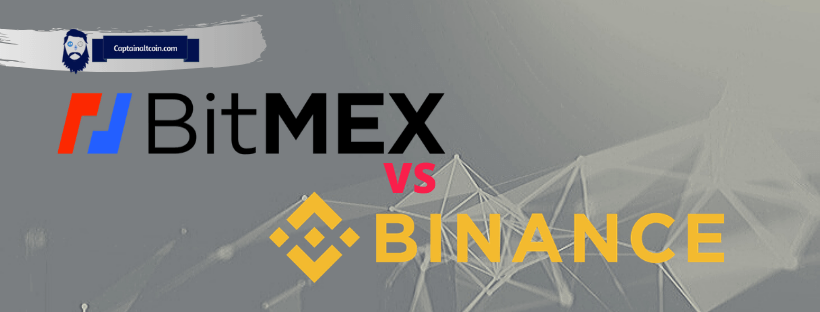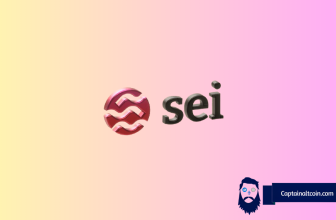
A half a year ago, there was almost no one that would be interested in comparison of Bitmex vs Binance as these two popular exchanges catered to different audiences and served different purposes. Binance was strictly focused on spot trading while BitMex was the overlord of margin trading exchanges.
This has changed in 2019 when Binance ventured into margin trading, leveraging and lending business itself. The decision which platform to choose, Binance or BitMex suddenly won in importance and we decided to put them under our magnifier and see who wins the race. Right away, it will be a dogfight and hard to crown a winner.
So let’s jump right into it.
What you'll learn 👉
BitMex vs Binance: General Info
Bitcoin Mercantile Exchange, or BitMEX, is a trading platform owned by HDR Global Trading Limited. HDR was founded in 2014 by three experts in the market – Arthur Hayes, Samuel Reed, and Ben Delo. Since then, investors have traded a combined $26.5 billion, which amounts to more than a fourth of the total bitcoin market cap. The company is based in the Republic of Seychelles and they offer a margin-trading service for experienced, professional Bitcoin traders.
Up to 100x leverage is available to users for Bitcoin, up to 50x for Ethereum, and up to 33.3x for Litecoin. There is also a selection of altcoins for spot and futures markets.
Binance is one of the largest and most popular cryptocurrency exchanges which initially started in China but then relocated their headquarters to the crypto-friendly Island of Malta in the EU. Binance is popular for its crypto to crypto exchange services. The company raised around $15 million in an ICO in July 2017. It immediately acquired 20,000 registered users as part of the raise.
Binance exploded onto the crypto world in the mania of 2017 and has since gone on to become the top crypto exchange in the world.
BitMex vs Binance: Fees
BitMex has very competitive fees and most users will find them almost negligible relative to the chunky profits to be made if you’re a savvy operator. The fees on Perpetual Swaps (and some of the futures) are currently -0.025% for the market makers and 0.075% for the market takers, so the marker actually grabs a little rebate on trades. You can read more about BitMex trading fees through this link.
Standard Binance trading fees are 0.1%, but by using Binance native token BNB, you can make considerable reduction to the fees, currently 25% less if you check the option to pay fees in BNB (instead of paying them in the coin you are buying).
| Type | Fee |
|---|---|
| Standard trading fee | 0.1% |
| Credit card purchase | The higher of either 3.5% or US$10 |
Trading fee discounts
| The discount | What it is | How much it is |
|---|---|---|
| BNB discount | A discount when paying trading fees with the BNB coin. | 25% discount |
| Tiered trading fee discounts | A discount for holding different amounts of BNB in your account while meeting trade volume requirements. | Reduces base trading fees to as low as a 0.02% maker fee and a 0.04% taker fee. |
Below is the comprehensive tabular overview of Binance fee structure:
| Level | 30d Trade Volume (BTC) | & | BNB Balance | Maker / Taker | Maker/TakerBNB 25% off | Maker/TakerBNB x Referral 25% off x Kickback 20% |
|---|---|---|---|---|---|---|
| VIP 0 | < 50 BTC | or | ≥ 0 BNB | 0.1000% / 0.1000% | 0.0750% / 0.0750% | 0.0600% / 0.0600% |
| VIP 1 | ≥ 50 BTC | & | ≥ 50 BNB | 0.0900% / 0.1000% | 0.0675% / 0.0750% | 0.0540% / 0.0600% |
| VIP 2 | ≥ 500 BTC | & | ≥ 200 BNB | 0.0800% / 0.1000% | 0.0600% / 0.0750% | 0.0480% / 0.0600% |
| VIP 3 | ≥ 1500 BTC | & | ≥ 500 BNB | 0.0700% / 0.1000% | 0.0525% / 0.0750% | 0.0420% / 0.0600% |
| VIP 4 | ≥ 4500 BTC | & | ≥ 1000 BNB | 0.0700% / 0.0900% | 0.0525% / 0.0675% | 0.0420% / 0.0540% |
| VIP 5 | ≥ 10000 BTC | & | ≥ 2000 BNB | 0.0600% / 0.0800% | 0.0450% / 0.0600% | 0.0360% / 0.0480% |
| VIP 6 | ≥ 20000 BTC | & | ≥ 3500 BNB | 0.0500% / 0.0700% | 0.0375% / 0.0525% | 0.0300% / 0.0420% |
| VIP 7 | ≥ 40000 BTC | & | ≥ 6000 BNB | 0.0400% / 0.0600% | 0.0300% / 0.0450% | 0.0240% / 0.0360% |
| VIP 8 | ≥ 80000 BTC | & | ≥ 9000 BNB | 0.0300% / 0.0500% | 0.0225% / 0.0375% | 0.0180% / 0.0300% |
| VIP 9 | ≥ 150000 BTC | & | ≥ 11000 BNB | 0.0200% / 0.0400% | 0.0150% / 0.0300% | 0.0120% / 0.0240% |
Binance vs BitMex: Buying limits
There are no limits on Bitmex, not on deposits nor on withdrawals. It is completely limit-free.
Binance introduced buying crypto with fiat last year, via their Binance Jersey daughter company. They use service called Simplex to execute these orders. Simplex charges 3.5 percent of a transaction with a $10 minimum (flat fee). The daily limit is $20,000 per user, while the monthly max is $50,000 per user.
There is no buying limit if you want to do crypto to crypto transactions. There is a withdrawal limit of 2 BTC for unverified accounts which gets lifted once you go through KYC procedure.
Deposit and withdrawal methods
BitMex is crypto only exchange so all deposits and withdrawals can be made strictly in bitcoin. Deposits and withdrawals are free of charge, which is always very pleasing. Once you’re done trading, you shouldn’t be left with any hidden costs (other than the Bitcoin network fees).
Since Binance main platform is crypto only, you can do deposits in any of the 150+ supported coins. Same goes for withdrawals – you just need the address on blockchain of the coin you want to withdraw.
Supported countries
BitMex itself is a registered company in the Republic of Seychelles, but is available worldwide. Thanks to the cryptocurrency nature of the site, the exchange doesn’t limit access for any locations. It’s important to note that local laws may affect your use of the service. However, this is out of the company’s control.
Binance does not specify which countries are supported and which countries are not supported but they did have couple of episodes of sudden blocks for traders from different countries around the world. As for the U.S traders, Binance made a separate platform, Binance US, to serve only US based traders and restricts them to use their main platform.
Supported coins
BitMEX supports the following cryptocurrencies:
- Bitcoin (XBT)
- Bitcoin Cash (BCH)
- Ethereum (ETH)
- Ethereum Classic (ETC)
- Litecoin (LTC)
- Ripple Token (XRP)
- Monero (XMR)
- Dash (DASH)
- Zcash (ZEC)
- Cardano (ADA)
- Tron (TRX)
- EOS Token (EOS)
Note: On BitMEX exchange Bitcoin is still denoted by XBT. ( The popular ticker name ‘BTC’ violates ISO 4217, and as according to this standard, it goes against the currency of Bhutan. Hence Bitmex went with the XBT ticker).
Binance has one of the broadest offerings when it comes to supported cryptocurrencies. The number of coins keeps growing by week and it exceeds 150 coins at the time of this writing.
Customer Support
Generally, it seems like customer support at BitMex is amongst the most knowledgeable in the market. Their team is polite, courteous, speak English well, and they try to cater to the expanding market and attempt to take the pressure off their customer service.
Customer support is offered via an email ticket, and the support even responds to social media messages. The exchange has a great website that is packed full of useful information and features. They also offer a knowledge base that gives a slick rundown of the exchange and helps to educate users on complex trades.
The customer service on Binance is also top-notch if you compare it with its peer exchanges. Worth noting, Binance provides customer support in 7 languages!
As of now there is no Binance support phone number, but they do have a customer support section where you can submit your requests. Usual turnaround time is around 24-hours. You can also use their live chat support option as shown here in the restricted operating hours. Apart from that, their FAQ section is quite detailed and if you go through it well, you may not really need to contact Binance support.
Trust and reputation
BitMEX is currently unregulated in any jurisdiction and the only security users have is their reputation in the community. Their team is well known and active on social media so in case of any frauds, people would know who needs to be hunted down. However, lack of official regulation is a big minus and huge risk, especially if you plan to margin trade larger amounts of crypto.
In its two short years of existence, Binance has gained a reputation for being fast and ferocious—sweeping aside peers on its rise to the top as one of the world’s biggest cryptocurrency exchanges by trading volume. Even though it is still unregulated (by any major finance authority aside of alleged regulation by Malta finance authorities), Binance enjoys very good reputation in crypto community thanks to their charismatic CEO CZ and his good communication and community management skills.
Security
BitMEX is reputed to have strong levels of security. The exchange uses multi-signature deposits and withdrawal schemes which can only be used by BitMEX partners. BitMEX also uses Amazon Web Services to protect the servers with text messages and two-factor authentication, as well as hardware tokens.
They have email notifications, and PGP encryption is used for all communication. All withdrawals are manually checked by their employees and are executed only once per day to minimize hacking risks (funds are held in cold storage).
Binance says it’s been awarded an information security accreditation after meeting standards set out by the International Organization for Standardization (ISO). For the audits, Binance was examined on 114 criteria across 14 categories, including security policy, asset management, operational security and information systems.
Binance had an apparent leak of up to 60,000 users’ know-your-customer verification data, though it pointed a finger at a third-party service provider at the time. They also suffered a funds loss worth $40 million during a hack in May 2019. However, they had a separate fund for such cases and they refunded all users with the money from that fund.
BitMex vs Binance: Margin trading
Bitmex offers margin trading in all of the cryptocurrencies displayed on the website. It also offers to trade with futures and derivatives – swaps. On BitMEX, users can leverage up to 100x on certain contracts. BitMEX also offers Binary series contracts, which are prediction-based contracts which can only settle at either 0 or 100. There are two types of Bitmex Margin Trading: Isolated and Cross-Margin. The former allows the user to select the amount of money in their wallet that should be used to hold their position after an order is placed. However, the latter provides that all of the money in the users’ wallet can be used to hold their position, and therefore should be treated with extreme caution.
One of the most recent features Binance added to their platform is margin trading. After transferring BNB coins from your regular exchange wallet to your Margin Wallet, you will be able to use those coins as collateral to borrow funds. Your Margin Wallet balance determines the amount of funds you can borrow, following a fixed rate of 5:1 (5x). So if you have 1 BTC, you can borrow 4 more. In this example, we will borrow 0.02 BTC.
Interest fee on borrowed coins varies depending on your account level and type of coin you borrowed. Bitcoin has the lowest daily interest rate of 0.0075%, followed by ETH at 0.01% and XRP with 0.02%.
Pros and Cons
BitMex Pros
- Low fees
- Futures and derivates trading
- Many advanced features available
- Nice trading platform
- Maximum leverage of 1:100 is available
BitMex Cons
- Not for beginner traders
- No fiat deposits / withdrawals available
Binance Pros
- Easy to Use
- Low Fees
- Good Support
- Lots of Listings
- Good Trading Interface
Binance Cons
- Doesn’t offer phone Support
BitMex vs Binance: Conclusion
So who wins the battle between BitMex and Binance?
- In terms of fees – we can compare them only in margin trading section since BitMex offers no spot trading. And in this category, BitMex is cheaper and wins the first race.
- In terms of supported currencies – clearly Binance.
- In terms of regulatory compliance and licensing: Both are nontransparent and unregulated so it is a negative point for both.
- In terms of customer support: Both are of similar quality and efficiency so it is a tie.
- When it comes to security in the BitMex vs Binance battle: Another close call but since Binance managed their hack attack in a very user-friendly manner (refunded the loss funds out their own pocket), it is tiny victory for them in this segment.
- Trading features: Binance wins this one as they simply have more services offered their platform while BitMex is fixated only on one service: leveraged trading.
- Overall reputation: another tie since both enjoy fairly good reputation in crypto community with sporadic complaints by individual customers. However, both of the exchanges founders are somewhat disputed in the broader crypto world as they are both brass and charismatic which rubs some people the wrong way.
If you are not fan of either of these exchanges, you can check some of the alternatives like eToro, Cex.io, PrimeXBT or PrimeBit.






